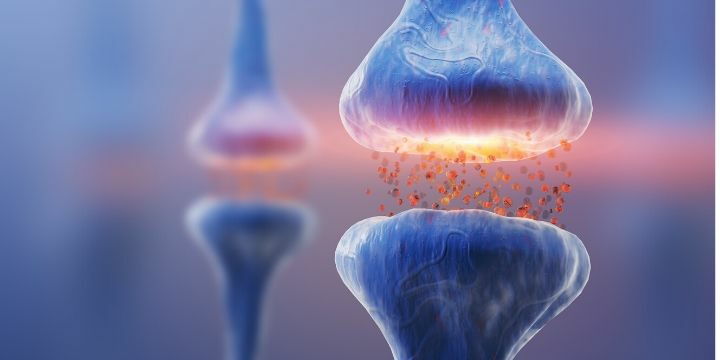What is GABA?

The γ-aminobutyric acid regulates brain excitability by inhibiting the release of neurons.
GABA, or gamma-aminobutyric acid, is an amino acid that performs the function of natural neurotransmitter and neuromodulator present in large quantities within our brain, where it acts as:
- anti-stress,
- anxiolytic,
- muscle relaxant,
- natural antidepressant.
Being GABA a neurotransmitter (therefore a messenger between neurons) helps to regulate nerve impulses transmission and to deliver different types of messages based on the differentiation between exciting neurotransmitters and inhibitory neurotransmitters.
GABA belongs to inhibitory neurotransmitters, that is, those that decrease the probability that a nerve impulse occurs with too much force and, by binding to specific receptors called GABA receptors or GABAergic receptors, transmits its "inhibitory message", slowing and relaxing the cerebral activity.
When GABA is available in sufficient quantities, it helps to maintain the balance in the chemistry within our brain, promoting a general sense of well-being, peace, and tranquility.
GABA: benefits

GABA is known as the neurotransmitter of calm and relaxation.
By helping to generate a feeling of calm, GABA is particularly effective for relaxing the body before going to sleep, avoiding insomnia and finding more restful sleep. This is synergistically combined with the fact of having a muscle relaxant effect that promotes muscle relaxation, thus also participating in muscle recovery after an effort or intense physical activity.
Several studies have shown that GABA is particularly interesting for:
- insomnia,
- high pressure,
- athletes who practice intense physical activity,
- states of overweight and obesity.
Given its "inhibitory", relaxing and rebalancing properties, GABA in the form of a supplement is used as an adjuvant in the treatment of many mental disorders, anorexia nervosa, bulimia, anxiety, and depressive states, also finding application for bipolar and l substance abuse, since it has been discovered that those who suffer from it often have a gamma-aminobutyric acid deficiency.
There is also research that argues that GABA can also be potentially interesting as an adjuvant to regulate blood pressure or as an antidiabetic potential. Some studies show that it could regenerate insulin-producing cells in the context of type I diabetes.
GABA deficiency
Low GABA levels have been found to have several adverse health impacts, particularly at the neuropsychic level. GABA tends to decrease with advancing age, although some people produce insufficient levels of this substance naturally from a young age.
GABA deficiency symptoms are related to ailments such as:
- anxiety,
- panic attacks,
- insomnia
- depression.
Research has shown that people with Parkinson's disease or dementia tend to produce low levels of GABA in the brain. Gamma-aminobutyric acid deficiency has also been linked to abuse and substance dependence.
How to increase GABA levels
Those suffering from low levels of gamma-aminobutyric acid could benefit from the use of GABA supplements during rehabilitation and the recovery phase. The ideal time to take a GABA supplement is before going to sleep since high levels of this amino acid help promote tranquility and relaxation.
GABA: side effects
The side effects that could appear when taking a GABA supplement are few, mild and transient, such as drowsiness, a slight alteration of the heart rate or the appearance of slight tingling, itching or tickling, however, sensations that typically last no longer than 20-40 minutes.
In the case of pregnancy and breastfeeding, there are still not enough studies confirming the safety of using GABA, so it is better to avoid taking it entirely. There are no other significant adverse side effects of this supplement.
Sources
- Evert Boonstra, Roy de Kleijn, Lorenza S. Colzato, Anneke Alkemade, Birte U. Forstmann, and Sander Nieuwenhuis,Front Psychol. 2015; 6: 1520. Published online 2015 Oct 6. Neurotransmitters as food supplements: the effects of GABA on brain and behavior https://www.ncbi.nlm.nih.gov/pmc/articles/PMC4594160/
- Abdou AM, Higashiguchi S, Horie K, Kim M, Hatta H, Yokogoshi H, Biofactors. 2006;26(3):201-8. Relaxation and immunity enhancement effects of gamma-aminobutyric acid (GABA) administration in humans, https://www.ncbi.nlm.nih.gov/pubmed/16971751
